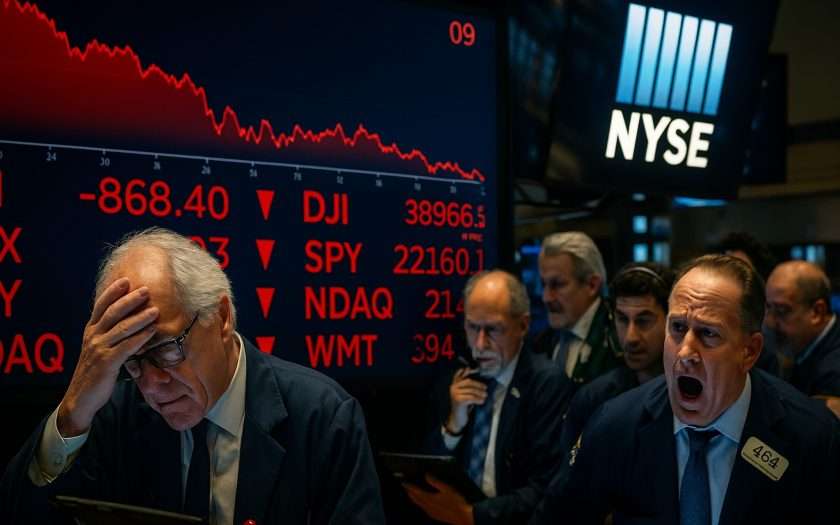 Wall Street was rocked on Friday, October 10, 2025, after President Donald Trump reignited trade tensions with China, announcing sweeping new tariffs on all Chinese imports. The move, framed as retaliation against Beijing’s tightening grip on rare earth exports, sent shockwaves through global markets and triggered a sharp sell-off in technology and AI-related stocks.
Wall Street was rocked on Friday, October 10, 2025, after President Donald Trump reignited trade tensions with China, announcing sweeping new tariffs on all Chinese imports. The move, framed as retaliation against Beijing’s tightening grip on rare earth exports, sent shockwaves through global markets and triggered a sharp sell-off in technology and AI-related stocks.
In a series of posts on Truth Social, Trump accused China of “extraordinarily aggressive” behaviour, citing a newly surfaced diplomatic letter that threatened to restrict exports of rare earth minerals to the U.S. These minerals are critical to manufacturing semiconductors, AI chips, and other advanced technologies. Trump’s response was swift and severe: a 100% tariff on all Chinese imports starting November 1, with additional restrictions on U.S. software exports under consideration.
“There is no way that China should be allowed to hold the World ‘captive,'” Trump wrote. “But that seems to have been their plan for quite some time.”
The announcement came just hours after the Nasdaq touched an intraday record high, catching investors off guard and triggering a broad market retreat. The Dow Jones Industrial Average plunged nearly 900 points, its worst single-day performance since April. The S&P 500 fell 2.5%, while the Nasdaq Composite dropped 2.7%. The Philadelphia Semiconductor Index, a key benchmark for chipmakers, sank 3.7%.
AI-focused companies bore the brunt of the sell-off. NVIDIA, a leader in AI chip design, saw its stock fall by nearly 5% to close at $183.16. AMD, another major player in the AI and gaming chip space, dropped a staggering 7.7%, ending the day at $214.90. Broadcom, which supplies networking and AI infrastructure, fell 5.9% to $324.63. Even Tesla, increasingly reliant on AI for autonomous driving and energy optimization, was not spared. Tesla’s shares slid 5.1% to $413.49.
The root of the crisis lies in China’s dominance over rare earth minerals. On October 9, Beijing announced new export controls requiring foreign companies to obtain licenses for any product containing rare earths, even if the content is less than 0.1% of the total value. This move was widely interpreted as a strategic manoeuvre to curb U.S. technological advancement and assert control over global supply chains.
Trump’s retaliation was not limited to tariffs. He also cancelled a planned meeting with Chinese President Xi Jinping at the upcoming APEC summit in South Korea, signalling a breakdown in diplomatic engagement. “I was to meet President Xi in two weeks… but now there seems to be no reason to do so,” Trump posted.
The AI sector is particularly vulnerable to disruptions in rare earth supply. These minerals are essential for producing high-performance processors, neural network accelerators, and quantum computing components. With China threatening to choke off access, U.S. firms face rising costs, production delays, and strategic uncertainty.
The broader tech sector also felt the sting. Apple, Amazon, and Alphabet all posted losses between 2% and 4%. Even Bitcoin was not immune. Bitcoin’s price plunged from $117,000 to below $108,000 before rebounding slightly. The CBOE Volatility Index (VIX), Wall Street’s fear gauge, spiked above 22 for the first time in four months, reflecting heightened investor anxiety.
This abrupt escalation marks a dramatic shift from earlier in the year, when both nations had agreed to scale back trade barriers following negotiations in Switzerland and the UK. That fragile truce now appears to be unravelling, with Trump’s latest move reigniting fears of a prolonged economic standoff.
Market analysts warn that the fallout could extend beyond equities. Supply chain disruptions, inflationary pressures, and geopolitical uncertainty may weigh on corporate earnings and global growth. Jeff Kilburg of KKM Financial summed up the mood: “Expectations for a China trade deal just got swept off the table.”
Friday’s market rout was a stark reminder of how fragile the global tech ecosystem remains in the face of geopolitical shocks. As Trump doubles down on tariffs and China tightens its grip on rare earths, the AI sector finds itself at the epicentre of a high-stakes economic confrontation.
For investors, the message is clear: trade policy is not just about tariffs. It is about the future of innovation. And right now, that future looks increasingly uncertain.
